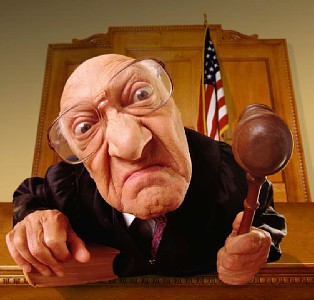Challenge to Masonic Control of Canadian Justice
October 3, 2011
Canadian courts stonewall a case demanding judges, lawyers and government officials reveal if they are Freemasons. The case claims Freemasons conspire against non-Masons.
by Eva Sydel
(henrymakow.com)
Over a decade ago, Eva Sydel began investigating Canada's income tax laws and joined the "De-tax movement." As a result she was selectively prosecuted by the Canadian tax authorities. She was convicted of tax evasion by British Columbia Judge Paul Meyers in July, 2006, and sentenced to 18 month in prison in October, 2007. She served 12 months in jail and was released 6 months early for good behaviour which is the usual procedure in Canadian prisons. She has no other criminal record.
The judicial manipulations of Freemasonry are now under review by the Supreme Court of Canada in a precedent setting case that could result in the banishment for Freemason lawyers and judges from Canada's courts and set an international legal precedent with far reaching implications.
This unique case, that is not reported in the Canadian media, arose when I was convicted of tax evasion and served 12 months in jail as a result of a selective prosecution intended to make me, in the words of a Canada taxation officer, "the poster girl for the de-tax movement in Canada".
When released from prison, the "poster girl" learned from an observer that Provincial Court of British Columbia Judge, Paul Meyers, and Canada Revenue Agency chief enforcement officer, Richard Olney, had communicated with a system of hand signals. The observer had worked with the deaf and was a magician by profession.
I consulted with a Canadian lawyer who was not a Freemason but who was aware of their judicial manipulations. The lawyer told her to obtain an affidavit from the observer and then apply to the court to set aside her conviction on the basis that the case was fixed by Freemasons.
She should also sue the Canadian government for damages for breach of its obligations to provide her a fair and impartial hearing before an independent tribunal, a right guaranteed by Canada's Charter of Rights and Freedoms and by international treaties and the United Nations Universal Declaration of Human Rights and the United Nations Covenant on Political and Civil Rights.
ALLEGATION ISN'T DENIED
A sworn affidavit was obtained from the observer who was in the courtroom confirming that he saw the judge and the Canada Revenue Agency Chief Enforcement officer secretly communicating by hand gestures, it was filed the affidavit with the Canadian courts and applications were made to set aside the conviction and advance a claim for monetary damages. The truth of the allegation in the affidavit was never denied by the Canadian Government that was defending against the applications and the allegation continues to stand as an un-refuted legal fact in Canada's court system.
To make matters worse, the Canadian Government refused to answer questions submitted in accordance with the Rules of Court about whether or not the judge and the Canadian Revenue Agency officer were Freemasons and if they were, in fact, communicating with one another by a system of sign language as alleged. Instead, the Canadian government quickly applied to court in British Columbia to dismiss the applications.
In the lower Canadian courts, the intrepid Canadian "poster girl" asked the presiding judges to disclose if they were Freemasons and, if so, withdraw from hearing the applications of the Canadian Government because Freemasons take an Oath to protect fellow Freemasons. The whole case was about Freemasons fixing a trial which is a criminal offence in Canada carrying a penalty of up to 14 years in jail.
The judges, Mr. Justice Stephen Kelleher and Madam Justice Marion Maisonville, both of the Supreme Court of British Columbia, refused to make the disclosure requested and dismissed the applications of the Canadian citizen. In addition, court registry staff in Vancouver were caught concealing one of the dismissal judgments so that the "poster girl" would miss the appeal deadline but, fortunately, she was alerted to the judgment by an informant.
A complaint about the alleged fraudulent conduct of the court registry staff was filed with the Chief Justice of the Supreme Court of British Columbia, Robert Bauman, the Canadian Judicial Council, Canada's Justice Minister, Rob Nicholson, and the Deputy Attorney General for British Columbia, David Loukedelis.
Complaints were also filed with Canada's national police force, the Royal Canadian Mounted Police (RCMP) and to Canada's intelligence service, the Canada's Security and Intelligence Service (CSIS) because it was now obvious that Freemasonry, a foreign controlled organization, had infiltrated Canada's courts.
read on

No comments:
Post a Comment